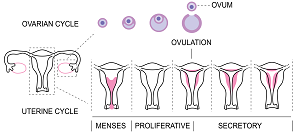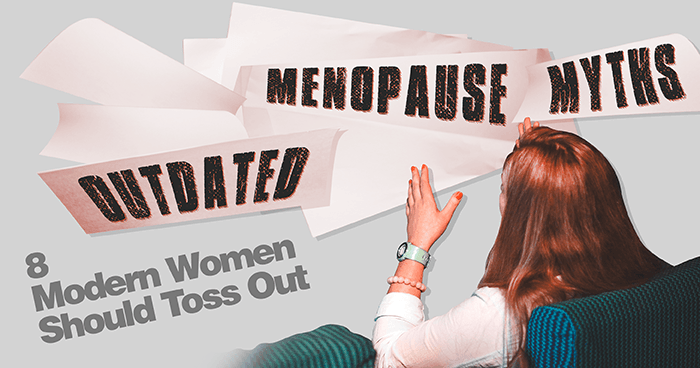Menopause is not the typical dinner conversation. The odds are that you and your friends would much rather talk about other things. In fact, you can probably think of many other topics you would rather discuss.
 However, the unfortunate reality is that menopause is coming. Whether you want to admit it or not, your body will undergo a massive change. For some women, this change occurs earlier than they would like. It is inevitable, so you might as well embrace it.
However, the unfortunate reality is that menopause is coming. Whether you want to admit it or not, your body will undergo a massive change. For some women, this change occurs earlier than they would like. It is inevitable, so you might as well embrace it.
With menopause comes an array of myths and rumors. Sometimes it can put your mind at ease to sort these myths from the truth. Here are eight myths that you should stop believing this instant.
1. Menopause Hits You Like A Brick
Rumor has it that menopause begins suddenly. Hot flashes overwhelm your body, and menopause begins immediately.It’s as if you wake up one day and a giant sign hangs over your head that reads, “Welcome to Menopause.” However, this is not entirely true. Most myths have a bit of truth to them, but the reality of the onset of menopause could not be further from this rumor.
 Menopause begins in stages. Perimenopause is the first phase of menopause. This is the beginning, or onset, of menopause. Perimenopause is the starting of the hormonal shifts that leads up to the actual phase of menopause.
Menopause begins in stages. Perimenopause is the first phase of menopause. This is the beginning, or onset, of menopause. Perimenopause is the starting of the hormonal shifts that leads up to the actual phase of menopause.
Menopause is basically the absence of menstrual periods for more than one year. Therefore, perimenopause is when menstrual periods begin to taper off gradually. When a woman is able to reproduce, hormones fluctuate constantly. As a woman ages, these hormones begin to cease, and this is known as the perimenopause stage.
The perimenopause stage can begin as early as 30 or as late as the mid-40’s. During perimenopause you experience the symptoms of menopause, but you cannot define it as menopause until menstrual cycles cease for more than 12 months.
Since it takes 12 months to start menopause, perimenopause will last at least one year. Therefore, there is nothing abrupt about the onset of menopause. There is also no definitive age for menopause.
2. Menopause Begins At The Age Of 50
Contrary to popular belief, there is no guaranteed age for the onset of menopause. While it would be lovely to have a forecast of when you can expect this not-so-welcomed change, there is never a guarantee.
Some women begin menopause as early as their mid-30’s, and other women are late bloomers who experience menopause in their 60’s. There is an average age of 52, but this is not the case for every woman.
Sometimes, women don’t even fully know when their own experience with menopause began. The period of perimenopause makes it difficult to have a definitive start date. Many women experience more of the stereotypical menopausal symptoms during perimenopause, so you might actually have some relief once menopause begins.
It is difficult to predict the moment when your menopause will begin, and it is sometimes even more difficult to know once it has started. You certainly cannot count on the following method.
3. The Onset Of Your Period Dictates The Age You Will Go through Menopause

Think back to when you experienced your first menstrual cycle. Yes, it is undoubtedly buried somewhere in your subconscious, unless you tucked it away from sheer embarrassment or psychological scarring. However, think back to whether or not you were an early bloomer or a late riser.
Wouldn’t it make sense that the women who experienced earlier menstruation would experience menopause earlier? Well, unfortunately this clean black and white prediction does not ring any truth at all. In fact, there is more truth to the exact opposite of this theory.
 If you want to know when you will begin menopause, there are a few other concrete ways to predict your cycle. First, you need to research a bit into your mother’s menopausal experience. When she started her perimenopause is a decent indicator of when you can look forward to beginning your cycle, as well.
If you want to know when you will begin menopause, there are a few other concrete ways to predict your cycle. First, you need to research a bit into your mother’s menopausal experience. When she started her perimenopause is a decent indicator of when you can look forward to beginning your cycle, as well.
Also, women who are heavy smokers can look forward to an earlier rather than later menopause. Someone who drinks daily can sit around and wait for menopause much longer than other women. In addition, someone who has had children is more likely to experience later menopause.
Once you know that menopause is coming, there are certain side effects that are most troubling. Weight gain is only the tip of the iceberg.
4. Menopause Is Synonymous With Weight Gain
 Many women assume that menopause means uncontrollable weight gain. It is indeed true that weight gain becomes a little more difficult after the onset of perimenopause, but it is not entirely impossible.
Many women assume that menopause means uncontrollable weight gain. It is indeed true that weight gain becomes a little more difficult after the onset of perimenopause, but it is not entirely impossible.
Weight loss becomes difficult due to the drop in sex hormones. This hormonal imbalance causes the body to protect itself by storing extra fat.
Typically, the fat is stored in the waist, thighs, and hips. It is the loss of estrogen that causes this effect. Thus, you can either counter it with estrogen supplements or be conscious of this change before it occurs.
Sometimes life events cause menopause to occur sooner than nature intended. Hysterectomies, for example, create some confusion about menopause.
5. Surgical Menopause Is The Same Thing As Natural Menopause
 The definition of a hysterectomy is the removal of a woman’s reproductive organs. This often includes the ovaries, uterus, cervix and sometimes the fallopian tubes entirely.
The definition of a hysterectomy is the removal of a woman’s reproductive organs. This often includes the ovaries, uterus, cervix and sometimes the fallopian tubes entirely.
Surgeons perform this procedure for myriads of different reasons, but the end result is the same. This procedure affects blood flow and hormone production. Women who have their ovaries removed are twice as likely to have lower testosterone, which in turn causes low libido and sexual functioning.
This surgery does stop the menstrual cycle, which technically makes it menopause. However, the effects felt are varied and it is difficult to tell from one woman to the next.
A lowered sex drive is a common concern for women experiencing menopause.
6. Your Sex Drive Goes Down
Menopause tends to be synonymous with a lowered sex drive. But is this necessarily true? For one reason or another, it has become normal thought to assume that you do not need to or want to have sex in your old age. However, this is not true at all.
 Anyone at any age can have a healthy sex life. Menopause causes some less than sexy effects, but they are all fixable. For example, the drastic drop in estrogen causes vaginal dryness. Also, this drop in estrogen causes a lower libido.
Anyone at any age can have a healthy sex life. Menopause causes some less than sexy effects, but they are all fixable. For example, the drastic drop in estrogen causes vaginal dryness. Also, this drop in estrogen causes a lower libido.
Purchasing an effective lubricant, such as those found at www.HerSolution.com can help fight these effects from lower estrogen levels. Healthy eating and exercise can also work to restore natural lubricants and mood. Be sure to consult your physician prior to starting any supplements or new routines. Your doctor will work with any allergies, prior history, and special needs your health has in store.
No one should ever suffer a slow sex life, menopausal or not. Some things, though, you are required to tolerate, like the hot flashes.
7. Hot Flashes Are The Devil’s Work
 No sooner does the room temperature feel like a sauna does a woman assume she has hit menopause. While hot flashes are certainly cumbersome, you can easily tolerate and even combat them.
No sooner does the room temperature feel like a sauna does a woman assume she has hit menopause. While hot flashes are certainly cumbersome, you can easily tolerate and even combat them.
Most women claim that hot flashes are worst in the beginning, during perimenopause. Hot flashes tend to vary in severity and duration from one woman to the next, but one thing is certain.
Treatment includes acupuncture, certain medications such as Paxil, and hormone replacement therapy. The less invasive options of exercise, remaining hydrated, and always wearing layers is always an option, too.
Lastly but not least, there is the fact that menopause encompasses much more than physical discomfort.
8. There Are Only Physical Symptoms With Menopause
 More often than not, women assume that menopausal symptoms are all physical. Everyone knows about the hot flashes, the cold sweats and the vaginal dryness.
More often than not, women assume that menopausal symptoms are all physical. Everyone knows about the hot flashes, the cold sweats and the vaginal dryness.
However, emotional response is the much less talked-about symptom of menopause.
This decrease in estrogen affects more than your physical well being. Perimenopause and menopause can both cause feelings of anxiety, depression, and alternating moods. This is absolutely normal, and there is nothing to be ashamed of if you are experiencing these symptoms. The changes in estrogen and progesterone cause mood swings. This hormonal imbalance also causes irritability and overall moodiness.
One expert made the analogy that menopause is as though your body is experiencing its adolescence in reverse. Many women begin to truly find their identities through this emotional time. The hormonal imbalance contributes to these emotions, but this does not necessarily have to be a bad thing.

In order to cope with menopause, it is imperative you become comfortable discussing the topic with your doctor. Make sure to start this conversation well before perimenopause begins.
Maintain a positive outlook and your menopausal experiences will not bring you down. You should use this time in your life to start new healthy habits. Take up yoga, exercise more often, or try new, healthier foods.
Besides you, your doctor knows your body best. Your physician can recommend the best preventative measures to suit your medical history, personal preference, and allergies or special needs.
Menopause is inevitable, so work to make it less burdensome. Don’t let this major life change break you. Instead, let it mold you into an even better, stronger woman.
Think of these bodily changes as a right of passage. It’s not that others have labeled you as an old lady. Instead, think of yourself as an experienced woman who can offer much more to the world than any other younger counterpart.
